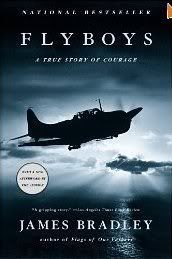 There's never a shortage of books to read here -- the difficulty is finding a good one. I picked this book up from the contributed books area near the battalion supply building because I like non-fiction.
There's never a shortage of books to read here -- the difficulty is finding a good one. I picked this book up from the contributed books area near the battalion supply building because I like non-fiction. I knew a James Bradley book would not be a happy one (he also wrote Flags of Our Fathers), but this is one depressing book. From beginning to end he lists one atrocity after another, performed by both sides of the Pacific War. The Japanese performed medical experiments on prisoners, tortured and executed even more, and in many cases were reduced to cannibalism by their leadership's inability to properly provision them. The Chinese had it worse, but the declassified story of eight American "Flyboys" downed over Chichi Jima (父島) showed just how bad it could be.
Two were killed "Chinese style." They were tied to posts and stabbed with bayonets everywhere *but* the heart. One was beaten to death with a club. Others were beheaded and had their livers removed to be eaten as a delicacy by high ranking Japanese officers. One was taken to Japan to live out the rest of the war as a POW.
One survived a deadly bailout that claimed the lives of his two crewmates and was then rescued from the water by a submarine. His name was George H. W. Bush.
The sadness and the cruelty in the story is compounded by the hypocrisy and the casual disregard for human life. Initially the U.S. protested Germany's bombing of civilians, but once we entered the war we had no issue with the Curtis LeMay's firebombing campaign on Japan. We prosecuted five Class B war criminal for their actions on Chichi Jima, but no American was ever prosecuted for shooting enemy pilots while they parachuted down or targeting Japan's civilian population. And certainly no one was held responsible for the lives of Japanese soldiers abandoned to disease and starvation by the high command's policy of "local provisioning."
Yet for all the death and destruction, one man escaped culpability: Emporer Hirohito. General MacArthur ordered against any proscution of Hirohito so that the new Japan would be more stable and more solidly anti-Communist. Despite his knowlege and approval of the horrors committed in his name, the emporer was never regarded as a war criminal.
The families of the seven executed Flyboys were never told by the government exactly what happened to their sons -- the contents of the war crimes trials were kept classified until 1997. It was only after Bradley's book about Iwo Jima that a veteran who had attended the trials came forward with a transcript. The fates of the families were perhaps the saddest of all -- some dissolved in probelsm alcohol while others obsessed over the MIA status, unable to let go.
One mother, though, survived to meet with the author and get a copy of the book. She said she didn't like to read the details of his death, but she found peace, at long last, in knowing for certain what happened to him.
If you're interested in the Japanese terms used in the book, I looked them up:
- 大和魂 - Yamato damashii - "Japanese spirit"
- 玉砕 - gyokusai - "smashed jewels" refers to the strategy of abandoning soldiers in a particular place and having them fight to the last man.
- 一銭五厘 - issen gorin - the price of postage for a draft notice, it referred to the "cannon fodder" draftees of the Japanese military
- 鬼畜 – kichiku – “devils,” the term used to dehumanize Japan’s enemies
- 臣民 – shinmin – Japan’s loyal imperial subjects
- 肝 – kimo – the liver, which symbolizes courage

No comments:
Post a Comment